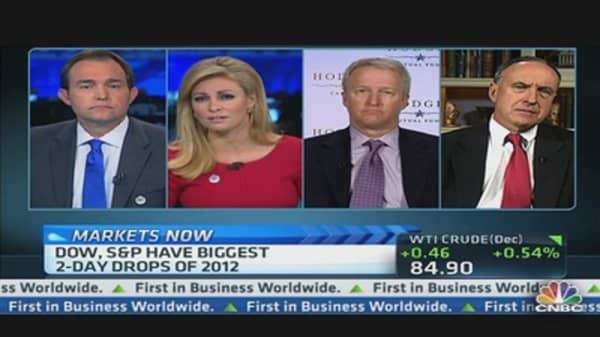Stocks finished near session lows Thursday, extending their losses a day after a massive post-election drop, as ongoing fears over the looming "fiscal cliff" trumped a pair of better-than-expected economic reports.
The Dow Jones Industrial Average tumbled 121.41 points, or 0.94 percent, to close at 12,811.32, logging another triple-digit decline. Cisco andMcDonald's were the biggest blue-chip laggards, while Bank of America gained.
The S&P 500 fell 17.02 points, or 1.22 percent, to finish at 1,377.51. The Nasdaq dropped 41.71 points, or 1.42 percent, to end at 2,895.58.
The CBOE Volatility Index, widely considered the best gauge of fear in the market, declined below 19.
With today's drop, the Dow, S&P 500, Nasdaq and the Russell 2000 are all below their 200-day moving averages.
All key S&P sectors finished in the red, led by energy and consumer discretionary.
Stocks took a sharp 2-percent nosedive in a post-election selloff Wednesday, with the Dow logging its biggest decline in nearly a year, prompted by concerns over the looming "fiscal cliff" and amid renewed worries over Europe's weak economy. (Read More: What Sell-Off Says About 'Cliff')
"We believe that the underlying U.S. economic fundamentals remain favorable," wrote Gary Thayer, chief macro strategist at Wells Fargo Advisors. "The economy is growing and the uncertainty of the election is behind us. If Congress and the president can find some middle ground and compromise over tax hikes and spending cuts, the outlook for the economy would be better than the worst-case scenario of allowing all the tax hikes and spending cuts to be implemented as scheduled."
Meanwhile, Standard & Poor's said it now sees a 15-percent chance that the economy will go over the "fiscal cliff" next year, even though policymakers will likely come up with a deal to avoid that outcome.
Among earnings, Qualcomm soared to lead the S&P 500 gainers after the semiconductor company posted quarterly results that beat expectations and handed in better-than-expected current quarter and full-year profit and sales guidance.
Kohl's posted slightly higher earnings and the department store chain forecast same-stores sales will rise during the current holiday quarter.
Dean Foods jumped after the food and beverage company topped earnings expectations and raised its full-year forecast.
After the closing bell, Disney, Groupon and Nordstrom are scheduled to report earnings.
Apple declined 2 percent, extending its losses a day after the tech giant closed in bear market territory, falling more than 20 percent from its all-time high. (Read More: 'Beginning of a Bull Market' for Apple?)
JPMorgan gained after the financial giant said U.S. regulators approved a plan for the company to use its capital to buy back its stock in the first quarter of 2013.
McDonald's declined to hit a 52-week low after the fast-food giant posted its first monthly sales drop in nine years due to the weak economy and intensifying competition.
On the economic front, jobless claims fell 8,000 to a seasonally adjusted 355,000 in the previous week, according to the Labor Department. Economists had expected a reading of 370,000. The four-week moving average rose 3,250 to 370,500.
And the U.S. trade deficit narrowed in September to $41.55 billion as exports increased, according to the Commerce Department, suggesting the economy expanded more than previously believed in the third quarter. Analysts expected the gap to widen to $45.0 billion.
European shares ended lower in choppy trading. The European Central Bank left interest rates unchanged at a record low of 0.75 percent as expected. ECB President Mario Draghi said growth momentum in the euro zone was expected to remain weak. (Read More: Europe's Next Worry—Germany in Recession)
Meanwhile, the Greek parliament passed further austerity measures by a narrow margin.
"Economic activity in the euro area is expected to remain weak although it continues to be supported by our monetary policy stance and financial market confidence has visibly improved on the back of our decisions as regards Outright Monetary Transactions," said Draghi at a press conference, referring to the bank's bond buying program unveiled in September.
The government auctioned $16 billion in 30-year bonds at a high yield of 2.820 percent. The bid-to-cover was 2.77.
—By CNBC's JeeYeon Park (Follow JeeYeon on Twitter: @JeeYeonParkCNBC)
Coming Up This Week:
FRIDAY: Import/export prices, consumer sentiment, wholesale trade; Earnings from JCPenney
More From CNBC.com:




